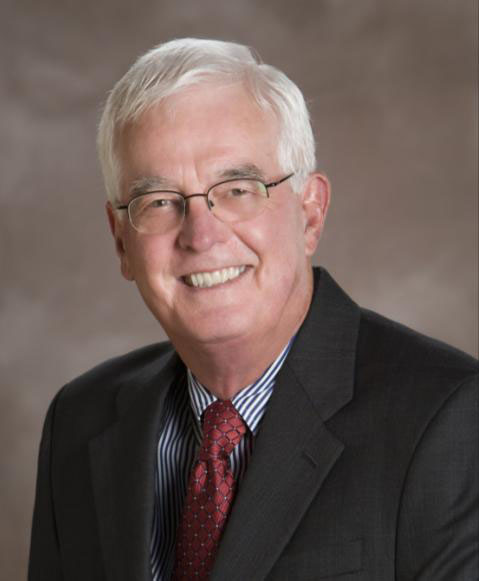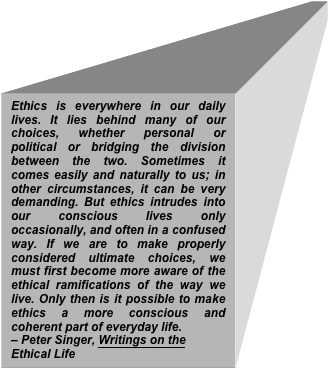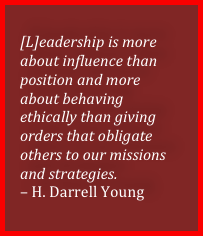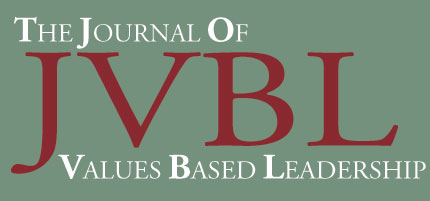- CONTENTS:
- Letter from the EditorTable of Contents"Smart"Change in Strategy: IBM’s Response to Challenging Times IBM and the Future: Building a Smarter PlanetOliver Winery and the Recipe for Values-Based Leadership: People, Product and PlaceHolistic Leadership: A Model for Leader-Member Engagement and Development A Tale of Two Cultures: Why Culture Trumps Core Values in Building Ethical OrganizationsLeadership: The Tabletop Concept The Leader as Moral Agent: Praise, Blame, and the Artificial Person

- THE LEADER AS MORAL AGENT: PRAISE, BLAME, AND THE ARTIFICIAL PERSON
Introduction

Joesph P. Hester
Don R. KillianEthics is normally thought of as a system of simple rules that guide how we live our lives. For the ordinary person, this comes to living by the principles ensconced in religion or accepted as customarily the "right" way to live. Emphasized in these rules are honesty, fairness, responsibility for one's behavior, and respect for others. Perhaps, deep down, many still believe in the sanctity of human life, all life. Of course, an ethic or moral theory should take an impartial view - sometimes referred to as "universal" - which means that in making ethical judgments, we go beyond our own likes and dislikes and give equal consideration to all who are affected by our decision-making. Moral integrity implies commitment to these principles and this involves a commitment to each other, to our tasks, and to the exercise of moral responsibility within our spheres of influence (Hunter, 2010). Peter Singer (2000) adds, "We are responsible not only for what we do but also for what we could have prevented. &#;We sh8230ould consider the consequences both of what we do and what we decide not to do." On this account, the moral agent is one who not only knows the difference between right and wrong, but cares about it as well. Yet, caring is not enough; the moral agent is one who knows how to resolve moral conflicts and is willing to act on ethical principles. Remaining faithful to our moral obligations implies both a commitment to and the ability to freely choose and make decisions - a moral agent is an autonomous person. Thus, a moral agent (either a person or a corporate body that speaks for and obligates others) is responsible for making and carrying out his/her decisions. Yet, the leader as moral agent is a concept that has perhaps been muddled and confused or even ignored in the history of modern corporate living.

The question of moral autonomy just may be the sine qua non of moral theory. Traditionally, only autonomous individuals are to be assigned moral blame or praise for their actions. But can we think of a moral agent independent of the social customs that define his or her mores or the role s/he plays as homo economicus? Thomas Hobbes was the first among modern thinkers to address this problem. He labeled those "who spoke for others" as feigned or fictional persons. Indeed, a leader is one who speaks for others, but we cannot conclude that leadership is only assigned the responsibility of being the overt voice of the corporation. More needs to be said, for certainly corporate decision-making casts a much wider net. The purpose of this paper is to restructure and clarify this idea.
Historical Background
Ethics has a long history, one that parallels developments in society, including the rational movement known as the Enlightenment, the Industrial Revolution, and the development of modern corporate organizations. As these developments unfolded, ethics began to lose its footing in both religion and natural law and distanced itself from the Victorian notions of fraternity, virtue, and the polite society. Perhaps the ethics we're referring to were only indigenous to the upper classes in Western societies, leaving the middle and lower classes at the mercy of the principle of survival of the fittest. At any rate, as cities grew larger, corporations lost their local footing, becoming national and international in both trade and influence. Within this scramble for economic prowess, the foundations of ethics became ambiguous as the decision-making process passed from individuals to corporate boards, trade commissions, the influence of the market, and government regulators. Given the worldwide financial crisis of 2009, many believe that both government and corporate leaders should embody ethical principles and remain faithful not only to what the law permits, but to certain moral obligations. This is sometimes referred to as "role morality," but these obligations are becoming more and more difficult to define and regulate - in law or in practice. Even more burdensome is how to place praise or blame for decisions made by corporate boards. Rushmore M. Kidder (2009) says that the financial crisis of 2009-2010 is primarily an "ethical recession" and not so much a political or economic one. Kidder states that "We need a language of ethics" that is applicable to corporate and organizational society. The Institute for Global Ethics (2009) summarizes, "Here, Kidder reflects on our progress in redefining ethics away from mere compliance and into values, and he comments on the sudden jolt that has shifted moral progress from an evolutionary to a revolutionary process. He calls on us to respond to the crisis - not simply by creating more ethical individual leaders, but by building more ethical organizational cultures."
One consequence of these changes has been the loss of a moral foundation as ethics became entangled in a morass of psychological relativism and utilitarian consequentialism. Utilitarianism makes the point that the goals we seek determine and justify the means we use to accomplish them. Being goal-oriented has been the major focus of utilitarian principles and has often overshadowed the "means" used to accomplish these goals. From a moral perspective, both are important and require the application of ethical principles by persons and corporations to safeguard the rights of all who are touched by their decisions. Another consequence of adopting both utilitarian principles and role morality is that the individual once thought of as an "independent self" - a person of both integrity and influence - and granted such metaphysical properties as freedom of choice and decision-making, has lost much of its meaning. Social theorist Max Weber (1956) reminded us that the individual is more a product of society and culture than a creation of divine law, imbued with an internal moral compass. This idea is today deeply embedded within corporate culture. Ethics now seems divided between applications to persons on the one hand and to social groups, corporations, and governments on the other. In the early days of the first Industrial Revolution, Thomas Hobbes (Leviathan, 1651) wondered if the corporate entity - the fictitious person - could be held morally accountable. Thus, we are compelled to ask if the leader - CEO, owner, corporate board, government official, etc. - can be held morally accountable or if this is an idea that has slipped into our ancient past?
In a recent conversation with H. Darrell Young (2010), CEO of CareCentric in Atlanta, Georgia, he mentioned that one of the problems - perhaps anticipated by Kidder - is that "value," "ethics," "character," and what is considered to be "right" behavior have become a moving target. As such, "what is right" has been defined by each generation, each organization, and each corporation to be "what is in their best interest." Young believes that within large and small corporations value flows "down," not "up." Therefore, if a board of directors or CEO remain uncommitted to a defined concept of ethical behavior, it is likely that position leaders and followers within the corporation will not be either. On the other hand, even if there is a commitment to ethics at the top, there is no guarantee that ethics will permeate the entire organization. "Vigilance and moral maintenance are required to offset the ethics recession of our times," Young says.
Leadership and Moral Responsibility
Leadership
H. Darrell Young (2004) writes that there are five basic things we know about leadership. As CEO of a national healthcare corporation, the following ideas are the results of his study and practice:
- Leadership development is a commitment to self-development and is achieved through lifelong learning, thinking, and consistent ethical living.
- There is no one set way to lead.
- Character is the foundation of leadership.
- The cost of leadership is beyond what most people are willing to pay.
- Because nothing happens until someone steps up, everything rises and falls on leadership.

These five observations are pertinent to the definition of "moral agent." They emphasize consistent ethical living, the development of one's moral character, the cost of following the principles of ethics, and the care one has for others. Young also notes the importance of the leader who has influence over the decision-making process of the board, committee, or congress. Several things emerged out of Young's study and practice of ethical leadership:
- The first is managing one's environment, which involves determining the values and beliefs of the organization and helping develop strategies for accomplishing one's goals. In this regard, he says that accurate self-assessment is important.
- The second thing is managing one's self. He notes that leadership is a process of lifelong self-development and change that requires a balance of behavior and the exercise of discipline. The emphasis here is on continuous improvement.
- Young also emphasizes influencing and serving others. He counsels would-be leaders to "divest of themselves and invest in others" by enabling, empowering, and serving them. He mentions that leaders are both followers and coaches who create value through performance. Young's maxim: "Performance, not promises," captures the meaning of this point.
- Although leaders possess power, position, and privilege, they should join these to ethical principles. Young says, "When strength is joined with compassion, others are liberated; when severity is balanced with gentleness, others begin to grow; and when patience is balanced with decisiveness, others begin to act responsibly."
- Finally, Young points out that the leader as moral agent understands that leadership is not about selfishness and personal gain, or being distant and impersonal; rather, leadership is earned and the true measure of leadership is the leader's influence or ability to get others to willingly participate in setting the goals and developing the strategies of the organization.
Moral Responsibility
The realities of contemporary society characterized by its overlapping of views of ethics remain strident supporting what is known as social pluralism. On the other hand, the idea of moral accountability, traditionally applied to particular persons as moral agents - persons who are capable of acting freely and deliberately - is a view that may not have lost its potency. The worldwide financial crisis of this decade and the senate hearings that followed in 2009, the involvement of Americans in Middle Eastern wars, and statements issued by British Petroleum in the wake of the disastrous oil spill in the Gulf of Mexico are examples of a moral duck-and-cover mentality that is pervasive in all areas of life and perhaps a telltale sign of moral relativism and consequentialism run amuck. Our own reflective intuition tells us that reason is still important and although ethics beg the question of scientific analysis, many think that we can apply reason - logic and critical thinking - to our choice-making and to our ideas of right and wrong behavior. Entangled with our ethical commitments are various religious ideas and dogmas. In Western culture, with the strings of Christianity still tugging at our coattails, many are hard-pressed to give up ethics as person-centered and evoke the simple teachings of bygone days as important for defining persons as catalysts of moral responsibility.
Moral responsibility and an understanding of personal morality - the acknowledgement that we have hurt others or otherwise done something unethical - has somehow managed to slip through the cultural fabric of our time. It has been replaced with a corporate culture that is able to cherry-pick those ethical values that serve a bureaucratic or social/occupational interest with the concomitant loss of the person as an independent and rational moral agent. Some also believe that looking after one's own personal self-interests is not only one's duty in a democratic/capitalistic society, but that it should be one's top priority. This is the point of view of normative egoism - that we ought to look after ourselves first - and relativism - that personal truth is the only truth that is necessary because my effectiveness as a leader is about me. It is an unwarranted, narcissistic focus on self-image and personal success.
This confusion of moral responsibility in which personal and socio-economic roles overlap compels us to ask, "Is the understanding of 'leader as moral agent' a relic of the past that is no longer applicable in the corporate world of the 21st century or is it just a convenient myth, perhaps propagated by the ancient Greeks and early Christians to instill obedience and individual responsibility into the masses?" One can conceivably argue that it is not that individuals do not make decisions that can be thought of as ethical or unethical, but they are not to be praised or blamed for their decisions. This is because they believe they have been coerced or pressured by corporate and business realities to make their decisions. The corporate mentality of groupthink and group decision-making often determines the context and action of a leader's decision. It is conceivable that the leader is a working part of this groupthink mentality, a process that covers individual responsibility for actions taken by the group (board of directors, trustees, board of elders/deacons, etc.). Thus, the leader may believe that his/her decisions were jointly made and not coerced at all.
Groupthink: An Ethical Compromise
In the late 1970s, Janis and Mann (1977) developed a theory of decision-making for occasions when the issues are strongly laden with emotion. They described the various patterns of coping behavior common in such conflicts and their consequences for rational decision-making, affirming various techniques for coping constructively with stress, primarily relying on vigilance. It is a truism that decision-makers need to be adequately informed before making decisions that affect others. They need to consider all the options available to them and also reconsider the emotional impact that is likely to accompany their decision, its aftermath, and come to grips with both the emotional responses in their discussions and the consequences that follow (Taylor, 2000). Needless to say, decision- makers as leaders should have a certain maturity of outlook and thought. This maturity is expressed in a sense of self-worth, a sense of belonging, a sense of expectancy, a sense of responsibility, a sense of accountability, and a sense of equality (DePree, 1989). This was not the case for the CEO of British Petroleum who recently said of the oil disaster in the Gulf of Mexico, "I was not a part of the decision-making process for that oil well." With that statement one can question the legitimacy of his role as leader and ask if he was unaware of the workings of his oil wells, then what policies were put in place, and by whom, to insulate him and others for violating government and company standard working procedures?
One of the outcomes of the above method of decision-making involves groupthink,a term introduced by William H. Whyte in a 1952 article in Fortune Magazine. Groupthinkis characterized by a group (organization) that feels invincible and extremely optimistic. The group reaches a decision without allowing members to express doubts about it. Members shield themselves emotionally and physically from any outside information that might undermine their decision. Finally, the group believes its decision is unanimous, even when unexpressed opposition exists. Since disagreements that exist both inside and outside the group are blocked, the decisions can often fail to achieve the desired result (Taylor, 2000).
According to Janis and Mann, "Decision-makers are often reluctant to take action, are beset by conflict, doubts, and worry, and struggle within incongruous longings, antipathies, and loyalties." They seek relief by procrastinating, rationalizing, and denying responsibility for their own choices, meaning defensive avoidance which in many cases in a kind of "ethical compromise." And when decisions are not ethically based, poor decisions are often made. We would argue that a collective pattern of ethical compromise characterizes the "groupthink decision dynamic." This dynamic is promoted when the group is highly cohesive, when it is insulated from outside criticism, when the leader is autocratic, and when the group does not search for and critically evaluate other options. Instead, group members rely on shared misconceptions and rationalizations. Ethical oversight is often neglected and they tend to make compromises that affect their commitment to ethical principles and to those whom their decision affects the most. Johnson and Johnson (1987) have observed eight symptoms of groupthink:
- Self-censorship:Each member minimizes any doubts about the apparent group consensus.
- Illusion of unanimity: Each member assumes that everyone (except oneself) is in agreement.
- Direct pressure on dissenters: Anyone expressing doubts is pressured to conform.
- Mind guards: Certain group members try to prevent dissenters from raising objections.
- Illusion of invulnerability: Members develop an illusion of invulnerability, characterized by unjustified optimism and extreme risk-taking.
- Rationalization: Group members invent justifications for whatever action has been taken or about to be undertaken, thus preventing misgivings and appropriate reconsideration.
- Illusion of morality: Members ignore the ethical consequences of the favored options and assume that the group's actions are morally justified.
- Stereotyping: Group members dismiss competitors, rivals, and critics as too weak or ignorant to react effectively or as too evil to justify genuine attempts at negotiations.

Groups many times make poor decisions, not because they have overlooked viable alternatives or options, but because they have done a poor job evaluating each option and choosing among the considered options. Systematic evaluation is painstaking in that each option needs to be subjected to a thorough analysis of its advantages and disadvantages before making a final decision. The more exact the systematic evaluation, the less likely some viable alternative will be overlooked. To ensure that diligent information processing takes place, Janis and Mann have recommended that the evaluation should include the following:
- The tangible gains of the group.
- The tangible gains and losses for significant others.
- Group self-approval or self-disapproval. (How will we feel if we make a certain choice?)
- The approval or disapproval of the group by significant others. (Will the important people we are connected with think we made the right decision?)
On the other hand, groupthink has been proven beneficial for it relies on the common sense intuitions of group members and evokes a top-down management philosophy.. Therefore it provides a coordinated, homogeneous response that represents the group or corporation as a whole. It is a kind of common sense paradigm for explaining and reacting to the world or their business environment. But groupthink can also be a problem. Zohar and Marshall (2004) have observed that "those who deviate or hold minority opinions or unpopular views can serve a positive purpose in groups, since they cause the group to reexamine the problem and alternatives." Minority opinions, especially those that cut against the grain of top-down leaders, are not easily handled. Many of these opinions come from employees who are experts in their particular fields. But group conflict inevitably arises and is fairly common. Gray (1984) comments, "Conflict can be a creative force if managed properly, but the groupthink phenomenon prevents this from happening, since conflict is never allowed to occur." A more accurate observation is that such conflict is usually confined within the group where members are sworn to support the majority opinion and not discuss the disagreements leading up to it.
Beginning with Descartes and his doubt, the modern mind has wanted to break free of the limitations imposed by tradition-bound society and unreflective thought-from Groupthink.It has wanted to break away from habit or revelation, and "hand-me-down" ideas, but in doing so we have fallen into a new groupthink pattern, possibly substituting expediency and greed for ethical decision-making and hiding the decisions that are made within the consciousness of the group rather than the people making the decisions.
Praise, Blame, and the Artificial Person
E. Wolgast (1992) writes, "By their standing in place of someone else whom they 'personate,' their [the leader's] actions become the actions of others." And here is the rub: when the leader - as a person or a group - leads the company into unethical practices with harmful results, how far down does the blame and retribution go? Has groupthink dissolved the leader's moral responsibilities? There is a snowball effect that comes into play here; workers (in leadership literature, called "followers") are required to carry out daily activities that support the purposes of the corporation. These workers, in their separated departments and specialized work, carry out their jobs efficiently, hoping to move up the organizational latter of success, but perhaps are uninformed and unaware of the ethical or unethical consequences of their collective pursuits. Who is to blame and who is to be punished when the public or the government discovers what has been done?
This conversation necessitates that we re-consider the role of the leader, in any organization, especially "the leader as moral agent." The question of the leader's personal moral autonomy and that of the employees who carry out the organization's work will always be a concern. Recently, James Davidson Hunter observed, "Leadership is, in part a set of practices surrounding the legitimate use of gifts, resources, position, and therefore influence (relational power)." From a moral perspective, what is and what is not "legitimate use," is what is being called into question. When CEOs, ministers, school superintendents, and government officials claim they didn't know "what would happen" due to the actions of the organization, is this enough to get them off the hook? When they claim they don't know who is responsible for the policies and actions of the organizations, then how is it that they retain their leadership positions? Maybe we should listen to H. Darrell Young who reasoned that leadership is more about influence than position and more about behaving ethically than giving orders that obligate others to our missions and strategies.
Moral Disembodiment
Leaders, it seems, have become disembodied through their organizational hierarchies and technologies and have lost their status as candidates for moral agents. As Wolgast remarked, "We have emptied 'morality' of meaning and thus live in a physical and moral geography of nowhere." Yet, if leadership has become disembodied, what of society and culture? Is this the moral breakdown that the religious and political right have been clamoring about? Perhaps it is! Hunter says, "The fact is, our lives are constituted by multiple spheres of activity and relationships that define the leadership we exercise. In short, everyone exercises leadership to varying degrees, for we all exercise relative influence in the wide variety of contexts in which we live." The inference in Hunter's remarks is that as the potency of leadership varies, so does the degree of moral responsibility over the activities we pursue. The point is, no one can escape the moral responsibility for his or her actions. Speaking from the point of view of common sense, we intuitively know the difficulties with this view, of assigning moral responsibility in degrees from one person or another in a corporate or organizational environment. Thus, the leader as moral agent is an understanding of leadership that must either be clarified or dismissed as a reliable platform for assigning moral culpability within the corporate environment.
Within this conversation, the idea of "value," especially "moral value," needs some clarification for it, too, has a history that has changed both its usage and meaning. In the nineteenth century, Friedrich Nietzsche gave new meaning to the word "value." Once thought of as connected to commodities, material things, and possessions (something of importance/value), Nietzsche attached "value" to "morality" and from that time, whenever value is mentioned, it has signified the moral beliefs of both persons and society. For Nietzsche, value was an intuitive and normative quality of all societies. This new meaning has, perhaps, itself changed as concomitant cultural shifts have made moral value just one among the many considerations being deliberated by corporate boards. Max Weber (1946), speaking from a sociological perspective, agreed that belief and value are a part of the cultural milieu - the customs and mores of societies. He reinforced his analysis with ideas from cultural anthropology that considered value as both subjective (a feeling, intuition, non-rational supposition) and relative (particular to either individuals or more likely, to groups (societies) of individuals (Himmelfarb, 1994).
By the beginning of the 20th century, thinking about value qua morality had come full circle as the utilitarians posited the idea that moral value is purely instrumental and its usage pragmatic. It had no internal or absolute foundation, but served only the purposes of individuals, groups, institutions, corporations, and governments. In other words, moral value had become definitively oblique, tilting in the winds of cultural change and justifying behaviors once thought of as immoral or, at best, out of step with the traditional virtues of society. It has not been a large step from tying moral value to society and culture to tying it to organizational, governmental, and corporate entities. Value in general and moral value in particular thus became just another societal trend. Even virtue, once attached to a person's character, became increasingly relative. This trend also continued in economic theory where the classical view of "rational man" as the unit of analysis for economic behavior and marketplace exchange changed by the late twentieth century with the help of behavioral economics. Raphael Sassower (2010) has observed, "In the 21st century, predictable irrationality is thought of as a normal mode of behavior. Instead of revising neoclassical economics to fit contemporary economic crises, many recommend following Adam Smith's original concerns for the social setting of individual behavior and to treat economic crises with pragmatic flexibility rather than with dogmatic ideology."
Conclusion: Playing by the Rules
DeMaurice Smith, Executive Director of the NFL's Players' Association, is quoted as saying, "Systems work as long as people play by the rules." In following this maxim, it has been the focus of this paper to show that "leader" is a word that does not only define one person, but often includes groups of persons, variously influenced by the thinking of the group. Thus, boards of directors, trustees, church elders and deacons, and even governing bodies are leaders who, by definition, obligate others to follow and carry out their decisions. When viewed from this perspective, common sense informs us that the persons who sit on such governing boards and are embedded within decision-making bodies are both individually and collectively to be held accountable for their actions. They are indeed moral agents who should be held accountable to those moral pursuits necessary for democratic-capitalism to survive and flourish in a world beset with a "me-first" mentality.
In 2003, Hester provided the following six basic principles for guiding and assessing ethical and non-ethical leaders:
- Caring for others is the first step toward ethical leadership.
- Recognizing the dignity and worth of those with whom you work and who are in your sphere of influence.
- Becoming a positive force for improving the human value within your workplace.
- Leading from character and with confidence and self-respect, which are the necessary first steps for personal and organizational improvement.
- Making creative change the norm by letting go of the command-control mentality and leading on the edge of creative possibility.
- Committing oneself to open communication and dialogue by including others in planning, initiating, and decision making processes.
We complete our analysis with words from ethicist Alasdair MacIntyre (1984) who observed, "The bifurcation of the contemporary social world into a realm of the organizational in which ends are taken to be given and are not available for rational scrutiny and a realm of the personal in which judgment and debate about values are central factors, but in which no rational social resolution of issues is available, finds its internalization, its inner representation, in the relation of the individual self to the roles and characters of social life." This bifurcation, MacIntyre reasons, is "an important clue to the central characteristics of modern societies and one which may enable us to avoid being deceived by their own internal political debates." These debates range, in broad categories between individualism and collectivism, those promoting individual liberty on the one hand and those committed to planning and regulation on the other. In other words, the debate is between persons and bureaucratic organizations. It is our contention that these two opposing views are not our only choices for alternative modes of social life. The ethical life remains a viable alternative available to those who understand the importance of an ethical democracy designed in part to regulate our capitalistic impulses.
In broad strokes, our history has brought us to this crisis. Don R. Killian (2010) has proposed an answer to this dilemma. He says, "The relationship we have with one another matters. The relationship is the defining ethic in our interpersonal communication and it is our ethical responsibility to nurture the relationship. Interpersonal communication cannot lose sight of one's relational responsibility to the other person or group of persons. Among other things, this means defining the ethical parameters that accompany the responsibility appropriate to a particular relationship." Ronald C. Arnett (2006) frames a pragmatic case for dialogic civility as a key interpersonal metaphor for negotiating difference in the public domain of postmodern communicative interaction. He says, "We live in a time in which ethical standpoints that traditionally have undergirded discourse are in contrast, dispute, and disruption. Dialogic civility is an interpersonal metaphor grounded in the public domain and in a pragmatic commitment to keeping the conversation going in a time of narrative confusion and virtue fragmentation."
References
Arnett, R. C. "Dialogic civility as pragmatic ethical praxis: an interpersonal metaphor for the public domain." Communication Theory, Volume 11, Issue 3, Pages 315 - 338, 10 Jan 2006. http://www3. interscience.wiley.com/journal/118990121/abstract?CRETRY=1&SRETRY=0.
DePree, M. (1989). Leadership is an art.New York, NY: Bantam Doubleday Dell Publishing Group.
Englewood Cliffs, NJ: Prentice-Hall.
Feldman, R. S. (1998). Social psychology. 2nd Ed.Upper Saddle River, NJ: Prentice-Hall, Inc.
Gray, J. & F. A. Starke (1984). Organizational behavior. Columbus, Toronto: Charles E. Merrill.
Hester, J. (2003). Ethical leadership for school administrators and teachers. West Jefferson, NC: McFarland and Co. Reissued as an E-Book in 2010.
Hester, J., D. Killian, B. Cox, & M. Fortner (2010). Values, morals, and civility, Seeking community in a divided world (2010). Unionville, NY: Royal Fireworks Press.
Himmelfarb, G. (1994). The de-moralization of society. New York, NY: Vintage Books.
Hobbes, T. (1651). Leviathan. Hammondsworth, England: Penguin, 1961.
Hunter, J. (2010). To change the world: the irony, tragedy, and possibility of Christianity in the late modern world. New York, NY: Oxford University.
Institute for Global Ethics (2009). http://www.globalethics.org/news/Recession-of-ethics-a-taxing-issue/events/Rush-Kidders-new-book/126/.
Janis I. & L. Mann (1977). Decision making. New York, NY: The Free Press.
Janis, I. (1982). Groupthink. Boston: Houghton-Mifflin Publishers.
Johnson, D. W. & F. P. Johnson (1987). Joining together: Group theory and group skills. 3rd Ed.
Kidder, R. M. (2009). The ethics recession. Rockland, ME. Institute for Goble Ethics.
MacIntyre, A. (1984). After virtue. Norte Dame, IN: University of Notre Dame Press.
Sassower, R. (June 15, 2010). Is homo economics extinct? Philosophy of the Social Sciences.
Singer, P. (2000). Writings on an ethical life. New York, NY: HarperCollins Publishers.
Smith, DeMaurice (July 17, 2010). Executive Director of the NFL's Players' Association. As quoted on ESPN.
Taylor, S. E., L. A. Peplau, & D. O. Spears (2000). Social psychology. 10th Ed. Upper Saddle River, NJ: Prentice-Hall, Inc.
Weber, M. (1946). From Max Weber: Essays in sociology, trans. and ed. H. H. Gerth and C. Wright Mills. New York, NY.
Wolgast, E. (1992). Ethics of an artificial person. Stanford, CA: Stanford University Press.
Young, H. Darrell. Conversation with Joe Hester, August 17, 2010.
Young, H. & J. Hester (2004). Leadership under construction. Lanham, MD: Scarecrow Press.
Zohar, D. & I. Marshall (1994). The Quantum society: Mind, physics, and new social vision.New York, NY: William Morrow and Company, Inc.
Author Biographies
Joseph P. Hester earned the Bachelor of Arts Degree in the Social Sciences and History from Lenoir-Rhyne College (University) in 1961. He is a 1964 and 1967 graduate of Southeastern Seminary at Wake Forest, NC where he earned both the Bachelor of Divinity and Master of Theology degrees. His master's thesis was an analysis of the theology of the 19th century Anglican minister and theologian Frederick W. Robertson. He earned the Ph.D. in Philosophy from the University of Georgia in 1973 completing his dissertation in analytical ethics. Working in the area of pre-college philosophy, he became a certified public school teacher and supervisor, earning doctoral certification as a Curriculum Specialist III. Hester is the author of many professional articles and books in philosophy, religion, and education. In the area of ethical leadership he authored Ethical Leadership for Public School Administrators and Teachers and, with H. Darrel Young, Leadership Under Construction.
Don R. Killian earned the Bachelor of Arts Degree in History and Sociology from Davidson College in 1961. He received his Masters of Arts Degree in Sociology from Appalachian State University in 1965. In 1968 he was awarded a National Science Foundation Scholarship to study anthropology at the University of Colorado. Additional graduate study at the University of Georgia in sociology and anthropology from 1969-1971 and the University of North Carolina at Greensboro in small group sociology completed his graduate school studies. He participated in the Basic Instructional Skills Program as an instructor for the North Carolina Department of Community Colleges from 1982-1987. He just completed his forty-fifth year teaching sociology at Gaston College, Dallas, NC. He is co-author of the two volume Cartoons for Thinking published by Royal Fireworks Press.

